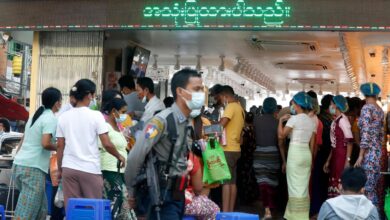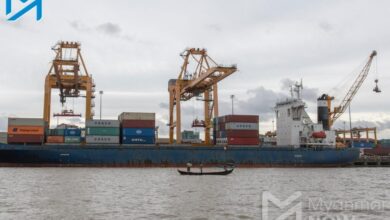
The Myanmar kyat continues to weaken against the US dollar, despite the sale of American currency reserves to the private sector by the junta-controlled Central Bank of Myanmar (CBM).
Since the February 1 coup, the CBM has released more than US$120 million into domestic markets in an attempt to combat the rapidly devaluing kyat.
There have been seven such sales of dollars in August alone, the most recent being $5 million on August 25 at a fixed rate of 1,663 kyat per dollar. The next day, KBZ Bank’s exchange rate was notably higher, at 1,676 kyat per dollar.
Dr Soe Tun, a Yangon-based entrepreneur whose businesses include currency exchange counters, said that rising exchange rates were controlled in the past by the sale of hard currency reserves by the CBM.
“At the moment, there is no sign of a decrease in the US currency price. It is increasing instead, because the demand for this currency is still growing,” he explained.
The amount of dollars being sold by the CBM is not sufficient to meet market demand, Soe Tun said, noting that “just to import an oil tanker of petroleum would cost more than $10 million.”
On the black market, the exchange rate for US currency has reached 1,700 kyat on average, but spiked to 1,805 on August 17, according to exchange agents who spoke to Myanmar Now. It signified the highest rate on record in 10 years, when it was fixed to a floating rate in 2011 by the military-backed administration headed by former president Thein Sein.
Two days before the coup, on January 29, the price of one US dollar was 1,326 kyat.
The junta-appointed CBM deputy governor and retired military officer Win Thaw blamed brokers—known to manipulate the market price of dollars—for the unstable exchange rate, in an interview with the BBC’s Burmese-language service on August 16.
“The exchange rate can be shaken up according to certain conditions, and the dollar price will increase periodically. It is totally normal to go through ups and downs, but the current state is abnormal with an unexpected increase because of brokers,” he said.
Since the military seized power in February, the need for dollars grew after the sudden halt to exports and foreign direct investment. The flow of US currency also stopped after sanctions were introduced by the US government and aid programs were suspended.
Soe Tun said that resuming exports to China through border trade could help strengthen the kyat.
“If there are more exports than imports, the value of the kyat will automatically rise. Otherwise, it is not right to sell dollars and take action against brokers,” he said of the growing trade deficit.
In addition to a weakening local currency, the inflation rate, which was 6 percent at the time of reporting, is expected to significantly increase in the coming months, according to the World Bank’s Myanmar Economic Monitor, published in late July.
In an August 16 report, a group of independent financial experts described the junta’s mismanagement as catastrophic, and said it could trigger a full-scale banking crisis for the country.



